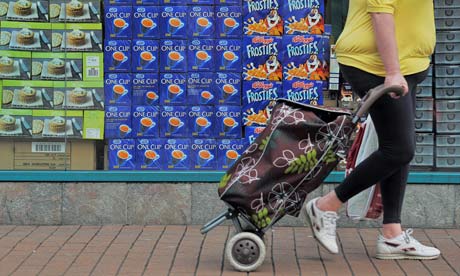
Vouchers and prepaid cards come with restrictions on what users can buy with them. Photograph: Carl De Souza/AFP/Getty Images
Your report on the arrival in Britain of food stamps highlights one of the many knock-on effects of the changes to welfare provision this year, some starting today, 1 April, and others coming later (UK poor to get food stamps in austerity drive, 27 March).
There is no doubt that hunger is on the rise in Britain, and urgent action is required to halt escalating numbers of people reliant on emergency food aid in this country. The report A Zero Hunger City: Tackling FoodPoverty in London, launched last week following an investigation on behalf of the London assembly's health and environment committee, examines food poverty in the capital and makes recommendations relevant to all of the UK about how hunger can be addressed. It focuses particularly on the rise of food banks and on child and pensioner hunger.
The report warns against the very real danger of food banks becoming part of the formal welfare system. Unless we heed the warnings from North America, we will unwittingly shift our welfare system towards a model in which the state becomes dependent on charity to function. If we take on board any lesson from the US and Canadian experience, it should be that, if we go down the North American route, food banks won't just be a temporary sticking plaster but a permanent feature of our society.
Fiona Twycross
Labour member of the London assembly
Fiona Twycross
Labour member of the London assembly
• Family Action is concerned that some of the most disadvantaged and marginalised individuals and families could face a postcode lottery of assistance with financial hardship. This is not only for the reasons mentioned in your article but also because pressures on local authorities to prioritise funding may lead them to implement local rules on entitlement. This could mean that people in crisis situations who urgently need financial help or those resettling after leaving refuges, prison or other institutions may receive different levels of support simply because of where they are geographically.
Welfare has a vital role in engaging some of the most excluded with services. In the experience of our support workers the offer of a grant to replace a broken cooker or to buy a decent bed can be an effective way of engaging the most difficult-to-reach families and individuals. Restricting the way in which the fund is distributed to vouchers and prepaid cards risks taking away a useful lever to engagement.
Giving service users some choice over a small cash budget can also have a transformative effect, helping to build self-esteem and a desire to engage with the process of change.
David Holmes
Chief executive, Family Action
David Holmes
Chief executive, Family Action
• Having read Zoe Williams (Tories want to relegate those on benefits to a world outside money, 28 March), I have to wonder how many of these "poor" people she knows. My 20-year-old son, his 19-year-old girlfriend and their son needed a crisis loan as he had lost his job and they had not received any benefits. The loan of £65 was paid into his bank and immediately disappeared out of his account to pay off a Wonga loan. If they had been given a food voucher, Wonga would not have got the money and they would have had something to eat.
Mary Daykin
Chorley, Lancashire
Mary Daykin
Chorley, Lancashire
• In the 1930s I worked in east London. By then a scale of cash payments had been introduced for the unemployed, but there remained an alternative of food tickets which were regarded as a stigma applied to the undeserving poor. It seems we are returning to that era.
Len Clark
Godalming, Surrey
Len Clark
Godalming, Surrey
• So, the government won't risk claimants squandering their social fund payments on fags and booze but is happy to trust them with several hundred pounds of housing benefit paid direct to their bank accounts each month. Can't the government make up its mind?
Louise ffoulkes
London
Louise ffoulkes
London
No comments:
Post a Comment